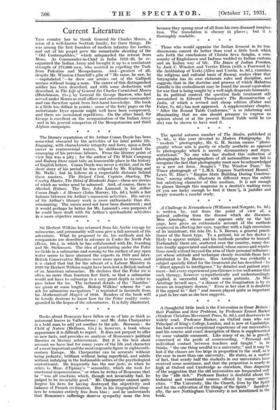Current Literature
Tins country has to thank General Sir Charles Monro, a scion of a well-known Scottish family, for three things. He was among the first founders of modem infantry fire tactics, and out of his gospel grew the remarkable shooting of the " Old Contemptibles," which safeguarded the retreat from Mom. As Commander-in-Chief in India 1916-20, he re- organized the Indian Army and brought it up to a combatant strength of 573,000 men, who assisted in expelling the Turk from Palestine and Mesopotamia. And—greatest of all, despite Mr. Winston Churchill's gibe of " He came, he saw, he —capitulated "—he drew our armies out of the Gallipoli morass without losing a man. The career of this distinguished soldier has been described, and with some deductions well described, in The Life of General Sir Charles Carmichael Monro (Hutchinson, 21s.), by General Sir George Barrow, who had served under Monro as staff-officer and subordinate commander and can therefore speak from first-hand knowledge. His book is a little too diffuse in points ; some of the forty pages on the unfortunate Dyer episode might well have been compressed, and there arc occasional repetitions. On the other hand, Sir • George is excellent on the reorganization of the Indian Army and in his general conspectus of the Mesopotamian and third Afghan campaigns.
• * *






































 Previous page
Previous page